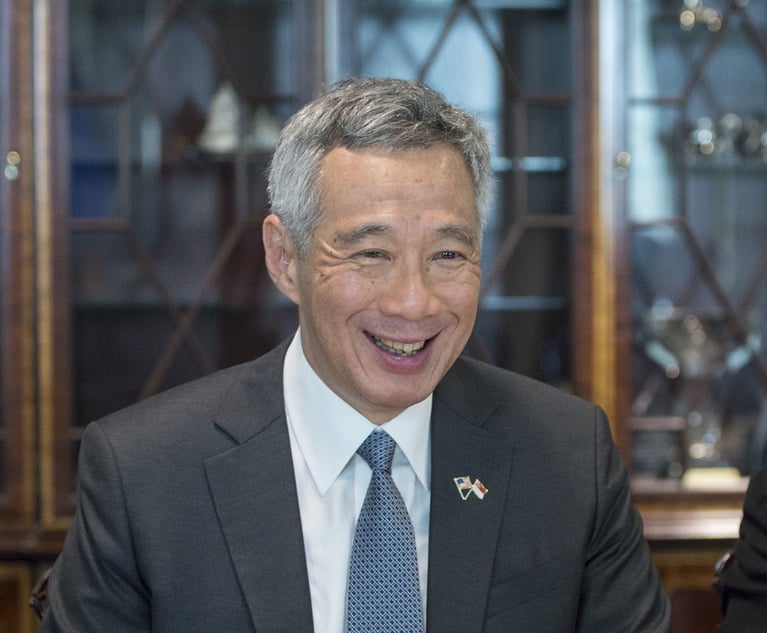Top firms aim to win full Hong Kong court rights as market liberalises
Solicitors in Hong Kong could appear in court from April this year as rules granting them full advocacy rights enter the final stages of implementation. The new legislation, which came into force last June, allow solicitors who undertake a formal assessment to be given higher rights of audience (HRA) at the High Court, Court of Appeal and Court of Final Appeal, expanding the scope of work they can undertake.
January 21, 2013 at 07:39 AM
3 minute read
Solicitors in Hong Kong could appear in court from April this year as rules granting them full advocacy rights enter the final stages of implementation.
The new legislation, which came into force last June, allow solicitors who undertake a formal assessment to be given higher rights of audience (HRA) at the High Court, Court of Appeal and Court of Final Appeal, expanding the scope of work they can undertake.
Until now barristers have dominated court roles, despite Hong Kong-qualified litigators being involved in almost all behind-the-scenes tasks such as preparing pleadings, putting together evidence and sourcing witnesses.
President of the Hong Kong Law Society Dieter Yih, who is also an M&A partner at US law firm Milbank Tweed Hadley & McCloy, said the new rules were a logical forward for the city, mirroring initiatives introduced in the UK in 1997.
"We have been petitioning for this for 10 years, and finally last June the legislation was passed," he told Legal Week.
"We [solicitors] feel that because we've been handling all the case work anyway it makes sense for us to represent the client in court, to advocate on their behalf. It's also expanding the amount of work that solicitors can do."
The rules would also benefit clients, he said, potentially saving large sums in legal fees.
"From a client or consumer point of view, you don't need to go and hire another set of lawyers. "[Solicitors and barristers] are often duplicating work, so logically speaking there must be a cost saving if your solicitor can represent you in court. It could be tens of thousands; it depends on the complexity of the case. It could be even more."
To qualify as a solicitor-advocate in Hong Kong, lawyers will first need to be examined by the Higher Rights Assessment Board, made up of a panel of judges, barristers and senior solicitors.
Those taking the test are to be trained in the city by a team of tutors from the UK-based College of Law, who have been invited to Hong Kong to run the course after submitting a successful tender to the Law Society's education arm, the Academy of Law.
Applications to participate in the training and assessment were received in September last year, with more than 100 individuals applying.
Those with substantial dispute resolution or litigation advocacy experience were permitted to request an exemption from elements of the process.
Yih said it is possible that all assessments will be completed by April.
"April is a possibility. It depends on when the assessment board can issue the results, when the College of Law can come out to do the tutorials, and when the assessment board can then assess these people afterwards. It takes a day or two to assess each person and it is not an easy task, but they will have a few teams of assessors. Is April realistic? Yes."
This content has been archived. It is available through our partners, LexisNexis® and Bloomberg Law.
To view this content, please continue to their sites.
Not a Lexis Subscriber?
Subscribe Now
Not a Bloomberg Law Subscriber?
Subscribe Now
NOT FOR REPRINT
© 2025 ALM Global, LLC, All Rights Reserved. Request academic re-use from www.copyright.com. All other uses, submit a request to [email protected]. For more information visit Asset & Logo Licensing.
You Might Like
View All
Singapore Leaders Stress the Importance of the Rule of Law Amid Geopolitical Tensions

Can Law Firms Avoid Landing on the 'Enemy' List During the Trump Administration?
5 minute read

Letter From Asia: Will Big Law Ever Bother to Understand Asia Again?
Trending Stories
- 1Reviewing Judge Merchan's Unconditional Discharge
- 2With New Civil Jury Selection Rule, Litigants Should Carefully Weigh Waiver Risks
- 3Young Lawyers Become Old(er) Lawyers
- 4Caught In the In Between: A Legal Roadmap for the Sandwich Generation
- 5Top 10 Developments, Lessons, and Reminders of 2024
Who Got The Work
J. Brugh Lower of Gibbons has entered an appearance for industrial equipment supplier Devco Corporation in a pending trademark infringement lawsuit. The suit, accusing the defendant of selling knock-off Graco products, was filed Dec. 18 in New Jersey District Court by Rivkin Radler on behalf of Graco Inc. and Graco Minnesota. The case, assigned to U.S. District Judge Zahid N. Quraishi, is 3:24-cv-11294, Graco Inc. et al v. Devco Corporation.
Who Got The Work
Rebecca Maller-Stein and Kent A. Yalowitz of Arnold & Porter Kaye Scholer have entered their appearances for Hanaco Venture Capital and its executives, Lior Prosor and David Frankel, in a pending securities lawsuit. The action, filed on Dec. 24 in New York Southern District Court by Zell, Aron & Co. on behalf of Goldeneye Advisors, accuses the defendants of negligently and fraudulently managing the plaintiff's $1 million investment. The case, assigned to U.S. District Judge Vernon S. Broderick, is 1:24-cv-09918, Goldeneye Advisors, LLC v. Hanaco Venture Capital, Ltd. et al.
Who Got The Work
Attorneys from A&O Shearman has stepped in as defense counsel for Toronto-Dominion Bank and other defendants in a pending securities class action. The suit, filed Dec. 11 in New York Southern District Court by Bleichmar Fonti & Auld, accuses the defendants of concealing the bank's 'pervasive' deficiencies in regards to its compliance with the Bank Secrecy Act and the quality of its anti-money laundering controls. The case, assigned to U.S. District Judge Arun Subramanian, is 1:24-cv-09445, Gonzalez v. The Toronto-Dominion Bank et al.
Who Got The Work
Crown Castle International, a Pennsylvania company providing shared communications infrastructure, has turned to Luke D. Wolf of Gordon Rees Scully Mansukhani to fend off a pending breach-of-contract lawsuit. The court action, filed Nov. 25 in Michigan Eastern District Court by Hooper Hathaway PC on behalf of The Town Residences LLC, accuses Crown Castle of failing to transfer approximately $30,000 in utility payments from T-Mobile in breach of a roof-top lease and assignment agreement. The case, assigned to U.S. District Judge Susan K. Declercq, is 2:24-cv-13131, The Town Residences LLC v. T-Mobile US, Inc. et al.
Who Got The Work
Wilfred P. Coronato and Daniel M. Schwartz of McCarter & English have stepped in as defense counsel to Electrolux Home Products Inc. in a pending product liability lawsuit. The court action, filed Nov. 26 in New York Eastern District Court by Poulos Lopiccolo PC and Nagel Rice LLP on behalf of David Stern, alleges that the defendant's refrigerators’ drawers and shelving repeatedly break and fall apart within months after purchase. The case, assigned to U.S. District Judge Joan M. Azrack, is 2:24-cv-08204, Stern v. Electrolux Home Products, Inc.
Featured Firms
Law Offices of Gary Martin Hays & Associates, P.C.
(470) 294-1674
Law Offices of Mark E. Salomone
(857) 444-6468
Smith & Hassler
(713) 739-1250








